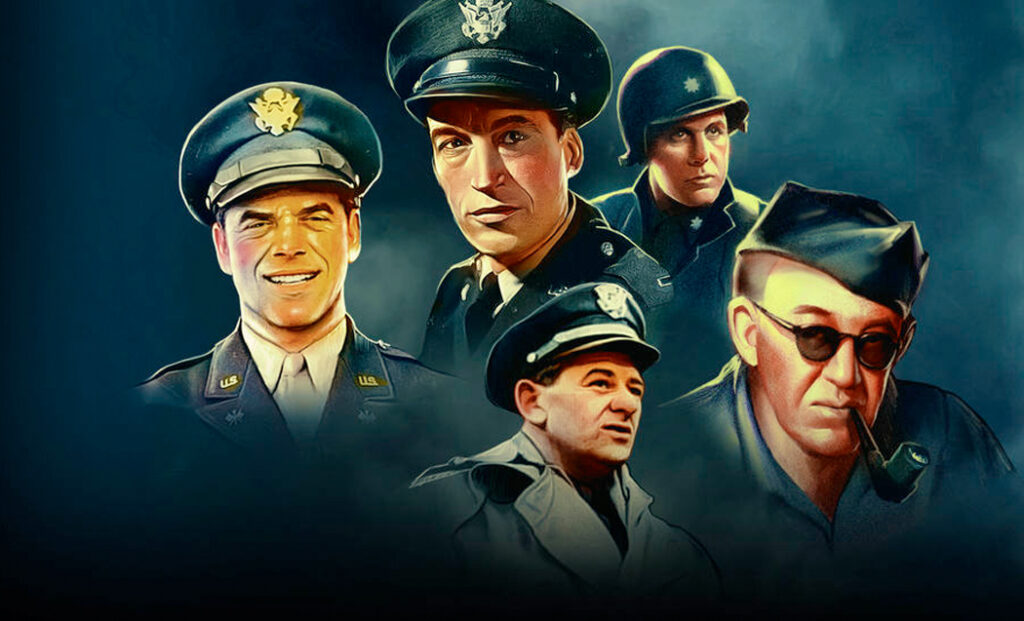
Five Who Came Back :
Five who Came Back has few effective flourishes of storytelling within it, less than should be expected from such a costly prestige production. Yet it doesn’t need them because the stories it tells are so effective and affecting. The stories are of war, living through it and how it affects you.
There may be nothing more of tragic, heartfelt, exciting or poignant than the story of a veteran and in this series there are five. The Five are directors John Ford, William Wyler, John Huston, Frank Capra and George Stevens. Wyler and Stevens may be less well known to modern audiences but their films Shane, The Diaryof Anne Frank, Jezebel, Roman Holiday, Funny Girl and Ben Hur are remembered classics.
In 1941 they were middle aged men, established and wealthy in their chosen professions. Some were regretful of not having served in World War I, Capra did serve stateside but contracted Spanish flu and was medically discharged. Some were patriotic, tellingly all five seemed to see the threat of what was happening in Europe as something that threatened the American way of life at a time when at least half of America did not.
In what seems impossible to comprehend happening now, the Army took them on, gave them commissions and sent them on assignments. These days the military has their own marketing machine and likes to control their image in house but back then the power of cinema was all consuming.
Most people got their entertainment and news from picture houses than anywhere else and harnessing this was seen as fundamental importance. Some saw little combat, some saw a great deal, most of them saw much death and were never the same. They returned and tried to pick up the pieces as best they could in a world that wanted to quickly move in.
Some of the footage here is remarkable and heartbreaking. One shot of a boat deck covered in blood and guts on D-Day, bodies piled high on top of each other at Dachau, planes falling thousands of feet to the ground while fellow airmen urge to see another chute appear out of it. This is when Five Came Back is at its most powerful.
The stories of these directors are relayed by five modern directors who mirror them in their own ways. I was sure they would pick Steven Spielberg to discuss Capra but instead the Italian immigrant is discussed by Mexican director Guillermo Del Toro and the Jewish Wyler is covered by the man who made Schlinder’s List.
Lawrence Kasdan discusses George Stevens as a man who made films of many genres rather than being seen as an auteur with a particular style. Both Paul Greengrass and John Ford were of Irish heritage, whom have a distinct style in how they direct. Francis Ford Coppola rose to prominence at a very young age directing some of the best films of his generation much like John Huston before him.
The whole series is narrated by Meryl Streep which makes for an interesting change from the voice usually assigned to such series. Most of these directors are heading past middle age and yet sometimes in discussing these men there is a child-like reverence in their voice and faces. This is even more touching when you realise as baby boomers these five directors were of the same generation as their own parents most likely and were certainly an influence on them as filmmakers growing up.
Yet while some of what they say is fascinating it lacks the intimacy of people who knew these men personally. There are some archival interviews with the actual five discussing the war but it all feels a little removed.
The book by Mark Harris the series is based on probably went into more details of certain facts and it would have been maybe more compelling to speak to more people who actually knew them as loved ones. In fact the most touching parts are seeing some of these men with their families both before and after the war.
Perennial Christmas favourite It’s A Wonderful Life was made by Capra after the war. A more mature pairing of the director with Jimmy Stewart which retained the idealism of their earlier efforts but is well known for displaying the anger and sorrow of Stewart who came back a decorated war hero forever hardened by what he had seen.
Capra saw little action if any having made one trip to London which was bombed throughout the war. He had however given everything he had to the war effort with hundreds under his command working on several productions. Having given up being one of the biggest directors in Hollywood he returned to it a short four years later to find nobody gave a damn about his efforts for their freedom.
In a moving moment of insight, the ending of It’s A Wonderful Life where Bailey races back to see his family become reflective or veterans racing to be reunited with loved ones, the plight of Bailey ceases to reflect just the torment of Stewart’s war experiences and becomes the revelation of Capra’s own frustrations following service.
It is insightful and moving and the rest of the series for the most part lacks such imagination. However in the end no matter how these stories or men are presented doesn’t matter; they are so compelling to hear that the series is undeniably one to watch.
These Five are representative of a much larger contribution made by a whole generation long ago and we should hear their stories. We should remember and we should take care of the generations of veterans who have followed them. Such deference is shown by their makers of this series themselves when they close with a message of hope from Capra himself and images shot by all five.
-Lloyd Marken

